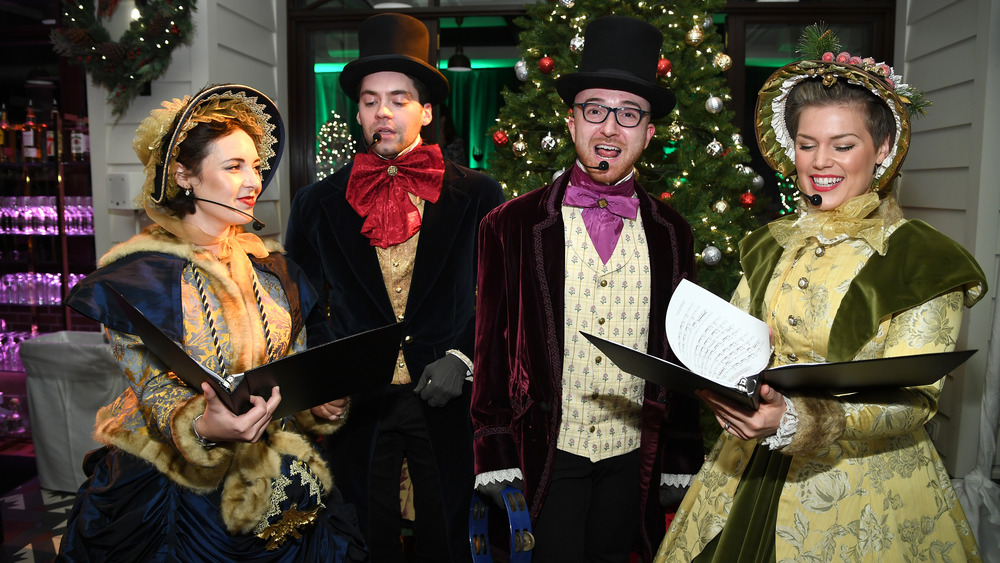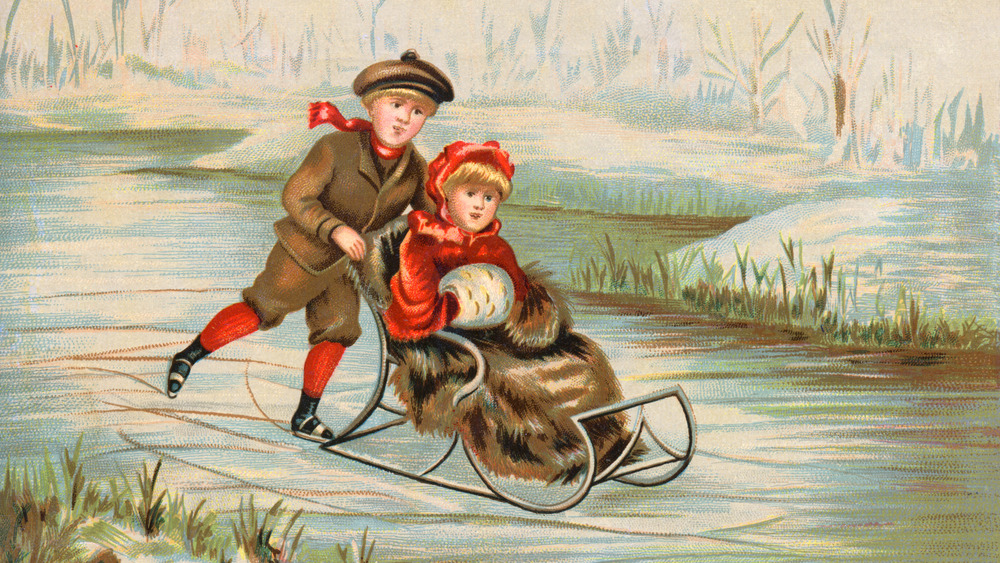Christmas Carols That Are Actually Pretty Dubious
Christmas music fills the airwaves from the moment the calendar rolls over to November all the way up to Christmas Day. Christmas really is the only holiday that has a dedicated, and extensive, body of popular music associated with it. And by "popular," we don't just mean contemporary. The Christmas season, after all, is the only time of year when you can tune into just about any radio station and hear music that quite literally spans the centuries.
The English carol, "O Come, O Come, Emmanuel," covered by artists as diverse as Kelly Clarkson and Bad Religion, dates back to 1851 (via Classic FM), while "Jingle Bells" is somewhere in the neighborhood of 170 years old. (Even the "Batman Smells" variant that you won't hear on the radio is over 50 years old by now, according to CBR.)
The more you listen to Christmas music over the two months where it's practically inescapable, the more head-scratching moments you're likely to experience. While Christmas carols, on the whole, are perfectly charming, they don't always make much sense.
Sleighing songs are so not relatable
Take all the songs about sleigh rides, for example. How many people can relate to them? Other than for winter tourism, sleighs as a form of transportation were basically obsolete by the time the snow tire was invented. According to the Wisconsin State Journal, they were on their way out by the 1920s. The only way most of us would ever have heard real sleigh bells attached to a real sleigh (said bells being used as an early version of the auto horn, rather than for their musical properties) is if we'd ever paid a winter visit to a living history museum located in any of the northern states or attended an over-the-top Victorian-themed winter wedding. And even then, it's only if the weather cooperated, since sleighs are pretty useless sans snow.
There is one bell-related song that references something still very much with us in the 21st century — "Silver Bells." The tintinnabulation in this quintessential urban carol comes from the bells rung by Salvation Army Santas. Fun fact from NewsTalk 1130: songwriters who penned this classic tune originally wanted to call it "Tinkle Bells." One of them went home and told his wife, and much Yuletide merriment ensued. Once she was able to stop laughing, she pointed out just what made that title so pants-wettingly funny. Whoopsie! Needless to say, a change of name (and undies) was in order.
Winter wonder...ing what these songs have to do with Christmas
The aforementioned sleighing songs fit into a larger category of so-called Christmas carols where the holiday itself is never even mentioned. Per History, "Jingle Bells" actually made its debut at a Thanksgiving church service, despite being 100 percent secular (and not particularly Thanksgiving-y, either), while both "Let It Snow" and "Baby, It's Cold Outside" only refer to the weather and not to any specific time of year. For all we know, they take place during a freakish cold snap in May. "Walking in a Winter Wonderland" is just about winter, period. Yes, there's a snowman in it, but snowpersons are something people build whenever there's sufficient snowfall, so you're just as likely to see them in January, February, or even March as in December.
Another well-known snowman, Frosty, merits a "carol" of his own, but again, there's absolutely nothing in the song to indicate it taking place anywhere around Christmastime. A close read of the lyrics, however, reveals something downright disturbing. Once you untangle the syntactical mess that is "he only paused a moment when he heard him holler 'Stop!'" you realize that he (Frosty) is antagonizing a law enforcement officer while armed with a somewhat weapon-like broomstick. Rather than a jolly tale of a short-lived snowman trying to carpe diem before he melts away, you get the makings of a very unpleasant incident sure to traumatize the children who'd witness it. Who knew magic-hatted snowmen could be so irresponsible?
Here come Santa songs
For centuries, Christmas carols were mostly religious in nature, although there were a few exceptions where people went a-wassailing and a hall-decking and a-fa-la-la-ing without any mention of "the reason for the season." Still, many of the pre-20th century classic carols we know and love do seem to focus on the nativity story, and no matter whether you do or do not share the religious affiliation, there's no denying the beauty of both words and music.
In the 20th century, the more secular songs really came into their own. From the slightly creepy, Santa-as-a-stalker "Santa Claus is Coming to Town" to the disturbing "I Saw Mommy Kissing Santa Claus," these Santa songs have their own weird little stories to tell. (Particularly the Michael Jackson version of the latter where he gleefully announces his intent to tell Daddy... hmm, something tells us Joe Jackson wouldn't have accepted that news too well.)
One of the oddest, however, is "Here Comes Santa Claus," written by cowboy movie star Gene Autry (via Lyrics for Christmas). The first two verses are typical Santa-song stuff, but in the 3rd verse, we have "Santa Claus knows we're all Gods children," while the 4th verse finishes up with "Peace on earth will come to all if we just follow the light, so let's give thanks to the Lord above that Santa Claus comes tonight!" Umm, wait, what? This has got to be the best-known, if not the first, secular/sacred Christmas carol mashup.
It's the most desperate time of the year
Once Christmas carols made the switch from sacred to secular, they tended to be about family holidays spent opening presents under the tree — familiar stuff, since we were all kids once. While there were a few "couples only" songs, these usually fell under the aforementioned heading of generic wintertime non-carols. In the 70s, though, things started changing. When Charles Brown's "Please Come Home for Christmas" came out in 1960, it barely dented the charts, but according to 92.9 The Lake, the Eagles' 1978 cover version brought this song into heavy rotation.
The floodgates really opened in 1985 when Wham! released "Last Christmas," thus establishing re-gifting of hearts as a new holiday tradition. By the way, what's up with the bit about "Tell me, baby, do you recognize me? Well, it's been a year, it doesn't surprise me," anyway? Why would your ex not recognize you after just 12 months unless all you'd had was a one-night stand? And if this was the case, you should have known that giving your heart would be ill-advised.
Worst of all, though, is that for the last 25 years, we've had to put up with Mariah Carey bellowing how the holidays won't be complete without a special someone. Thanks a bunch, Mariah, for transforming Christmas into yet another occasion for singles to feel bad, just like Valentine's Day and New Year's Eve. No wonder her ubiquitous hit is many people's most hated Christmas song!




